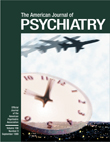Attitudes Toward Psychiatry as a Prospective Career Among Students Entering Medical School
Abstract
OBJECTIVE: The number of U.S. medical graduates choosing careers in psychiatry is in decline. In order to determine whether this disinclination toward psychiatry occurs before versus during medical school, this study surveyed medical students at the start of their freshman year. METHOD: Within the first 2 weeks of medical training, 223 freshman medical students from three Southwestern medical schools were surveyed with a questionnaire designed to assess their perceptions of careers in various specialties. RESULTS: Responses suggest that new medical students most strongly value aspects of doctoring that seem to comport well with the actual practice of psychiatry: desire for interpersonal contact, helping patients, attractive lifestyle, and challenging work. However, these students begin their medical training viewing a career in psychiatry as distinctly and consistently less attractive than other specialties surveyed. More than one-quarter of the new medical students had already definitively ruled out a career in psychiatry. New medical students rated psychiatry significantly lower than each of the other specialties in regard to the degree to which it was a satisfying job, financially rewarding, enjoyable work, prestigious, helpful to patients, dealing with an interesting subject matter, intellectually challenging, drawing on all aspects of medical training, based on a reliable scientific foundation, expected to have a bright and interesting future, and a rapidly advancing field of understanding and treatment. CONCLUSIONS: Contrasting these results with previous studies suggests that an erosion has occurred over the past two decades in the attitudes that new medical students hold toward psychiatry. The authors suggest that some of the negative attitudes are based on objectifiably false beliefs that should be actively targeted for remediation within the medical school curriculum.



